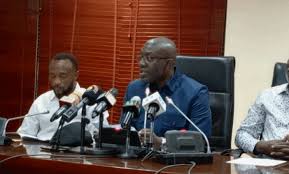The introduction of the Energy Sector Levies (Amendment) Bill, 2025 in Ghana’s Parliament has sparked strong political debate between the Majority and the Minority, with accusations of deception, betrayal, and mismanagement flying across the aisle.
The Bill, introduced by Finance Minister Dr. Cassiel Ato Forson on Tuesday, June 3, proposes an increase in the energy sector levy from 20 pesewas to GH¢1 per liter of fuel. It aims to raise funds to settle Ghana’s $3.1 billion energy sector debt, out of which $1.7 billion is owed to Independent Power Producers (IPPs). The move is expected to generate GH¢5.7 billion annually to support fuel procurement for thermal power plants and ease recurring payment deficits.
Mr. Emmanuel Kwasi Bedzrah, Chairperson of the Parliamentary Energy Committee, dismissed claims by the Minority that the government was dishonest about the levy. He told the Parliamentary Press Corps in Accra that “the GH¢1 levy will not affect fuel prices,” citing the recent reduction in fuel costs from over GH¢16 per liter in January 2025 to about GH¢12 in June.
Mr. Bedzrah defended the Bill, explaining that the monthly deficit in the energy sector stands at GH¢2 billion, and that the levy is a necessary intervention to stabilise power supply and ensure energy security.
He also responded to criticism from the opposition, stating:
“All Minority members were present at the committee level when the Bill was reviewed. How can they now claim they were not informed or consulted? Let’s not politicise power — it lights our homes, powers our hospitals and runs our industries.”
However, the Minority in Parliament, particularly from the New Patriotic Party (NPP), has rejected the Bill, calling it “a betrayal of public trust” and accusing the government of double standards.
At a press conference held on Monday, June 9, Mr. George Kwame Aboagye, NPP MP and Ranking Member on the Energy Committee, said:
“We were told by Dr. Ato Forson during the 2025 Budget presentation that government will not impose taxes to settle energy sector debts. Yet, here we are, facing a fresh and steep levy.”
He compared the new “Dumsor Levy” to the E-Levy, noting that while the E-Levy was subjected to public consultation and capped at 1% with exemptions for transactions below GH¢100, the new levy was “smuggled through Parliament” without transparency or thresholds.
He warned that the Dumsor Levy could trigger a ripple effect on transport costs, commodity prices, and general inflation.
Joining in the criticism, Mr. Kojo Oppong Nkrumah, NPP MP for Ofoase-Ayirebi and Ranking Member on the Economy and Development Committee, proposed alternative solutions to Ghana’s energy debt crisis. These include:
Renegotiating Power Purchase Agreements (PPAs) to eliminate excess capacity charges.
Improving operational efficiency at power institutions like GRIDCo and ECG.
Investing in renewable energy to reduce dependence on imported fuel.
He said the NPP Caucus will engage citizens, civil society organisations, and media platforms to raise awareness of the levy’s potential economic burden.
“We stand in solidarity with driver unions and oil marketing companies who are opposing the levy. This government must listen and withdraw it in favour of more pragmatic solutions.”
Meanwhile, Minority Leader Alexander Kwamena Afenyo-Markin added that the government’s pattern of introducing new taxes while claiming to remove others is misleading.
“Mr. Speaker, this new levy will only worsen the economic struggles of ordinary Ghanaians.”
However, the government insists the appreciation of the cedi in recent months will absorb the impact of the increased tax and prevent fuel prices from rising further at the pump.
Dr. Forson told Parliament:
“There will be no significant net effect on consumers. The levy is about stabilising the power sector and ensuring long-term national interest.”
The controversy underscores the deep divisions over how Ghana should tackle its ballooning energy debts and balance the urgent need for reliable electricity with economic affordability.
